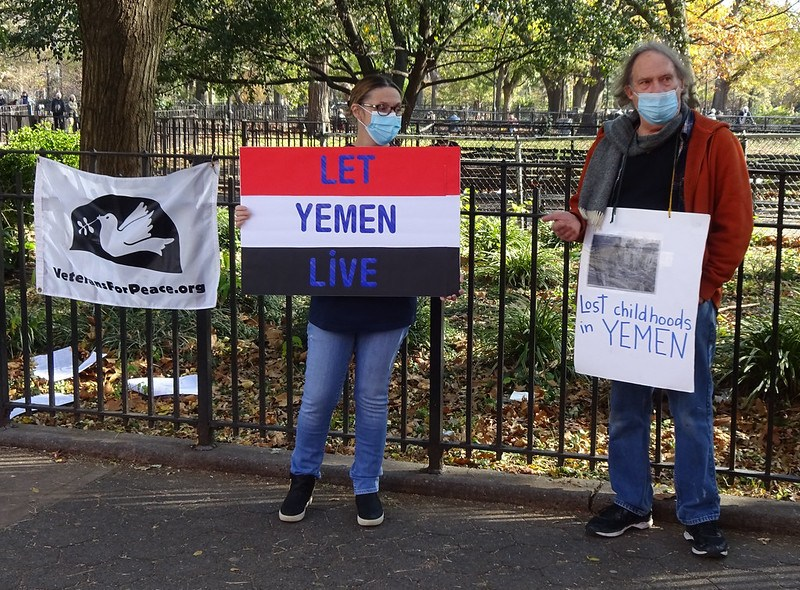
Senate Republicans, abetted by the two Democrats from Arizona, on Wednesday killed two resolutions which would have blocked President Donald Trump’s proposed $23 billion weapons sale to the United Arab Emirates.
Senators Bob Menendez (D-NJ), Chris Murphy (D-CONN), and Rand Paul (R-KY) introduced the resolutions. Senate Joint Resolution 77 would have blocked the sale of up to 18 weapons-ready MQ-9B Reaper unmanned drones. Senate Joint Resolution 78 would have blocked the sale of 50 F-35 stealth warplanes, America’s most advanced fighter jet. (Senator Murphy notes that this is “the second-largest ever sale of U.S. drones to a single country.”)
President Donald Trump vetoed similar resolutions twice in the past. This time he didn’t have to. In a mostly party-line vote, the two resolutions were defeated 46 to 50 (Reapers) and 47 to 49 (F-35s).
According to Politico: “Senate Intelligence Committee Chairman Marco Rubio (R-Fla) initially expressed concerns about the sale’s impact on Israel, but told POLITICO this week that ‘I’ve been assured by the Israelis that they feel good about it.’”
I’m sure they do. Whatever objections Israel would normally have to lavishing advanced weapons on an Arab state vanished with the signing of the Abraham Accords on September 15. The Abraham Accords, negotiated by the Trump Administration, normalize relations between Israel and the UAE. The $23 billion arms sale was the UAE’s reward for agreeing to normalization.
Who else feels good about the sale? Lockheed Martin, which manufactures the F-35, and General Atomics, which manufactures the Reaper unmanned drone. The $23 billion the sale represents will go directly into their already over-stuffed pockets.
Failure to quash the sale is terrible news for the country of Yemen. The UAE is part of a military coalition headed by the Kingdom of Saudi Arabia, which has been pounding Yemen with bombs since 2015. To its lasting shame, the US assists the coalition with target-spotting, intelligence sharing, provision of spare parts for coalition warplanes—and lots and lots of arms sales. Nobel Peace Prize laureate President Barack Obama took the US into the war as a sop to the Gulf States which had opposed Obama’s nuclear deal with Iran.
Twenty-nine human rights and arms control groups, including the Arms Control Association, Cato Institute, Friends Committee on National Legislation, and Win Without War drafted a letter opposing the sale. The letter states that airstrikes and the coalition’s land, sea, and air blockade of Yemen have caused “the majority of civilian casualties” as well as “starvation, and illness brought about by the destruction of schools, hospitals, markets, and other essential infrastructure and services.” The letter declares that “the proposed sales violate long-standing provisions in the Foreign Assistance Act that prohibit the United States from providing arms and security assistance to perpetrators of gross human rights abuses.”
End-use restrictions attached to US arms sales are supposed to keep US weapons out of the hands of human rights violators. However, Senator Chris Murphy, a co-sponsor of the failed resolutions, says that “The UAE has violated past arms sales agreements, resulting in U.S. arms ending up in the arms of dangerous militia groups, and they have failed to comply with international law in Libya and Yemen.” Senator Murphy is correct, although “ending up” makes this sound inadvertent. It isn’t. The UAE deliberately transfers US weapons to militia groups in Yemen which advance UAE goals. These include militias loyal to Al-Qaeda in the Arabian Peninsula.
Against these powerful reasons for stopping the UAE arms sale, the Trump Administration counterposes our old friend the Iranian bogeyman. A December 9 White House statement cites supposed “increasing Iranian aggressive behavior” following the signing of the Abraham Accords. The statement from the White House says that the $23 billion sale will make the UAE “more capable of exercising its inherent right of national self-defense.” There is not one word about Emirati aggression in Yemen.
President-elect Joe Biden says that he wants to end US support for the Saudi-Emirati coalition. Biden can terminate Trump’s UAE arms deal. Will he? Biden is no dove. One-third of Biden’s transition team is made up of persons connected to organizations funded by arms manufacturers, including General Dynamics, Raytheon, Northrop Grumman, and Lockheed Martin. Biden’s pick for secretary of defense, General Lloyd Austin III, is on Raytheon’s Board of Directors. Will the Biden Administration pursue peace or war? We shall see.
 Eurasia Press & News
Eurasia Press & News



